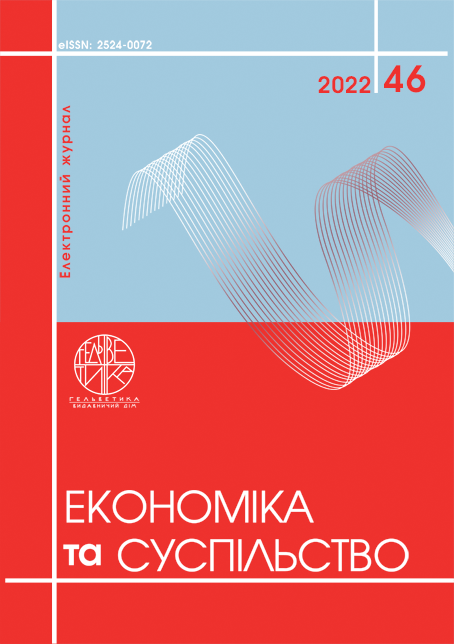FORMING TERRITORIAL MODEL OF FINANCIAL AND ECONOMIC STIMULATION OF SECONDARY RESOURCE USE: PREREQUISITES AND PRIORITIES
Abstract
The article deals with the expediency of activating the processes of secondary resource use as an important prerequisite for increasing the material base of industrial production and ensuring the energy self-sufficiency of the country, regions and territorial communities of the basic level under conditions of martial law. It is examined that speeding up activation of secondary resource use processes depends on decentralization of industrial and household waste management processes. It is substantiated that the key element of the decentralization of waste utilization management is developing territorial model of financial and economic stimulation of secondary resource use, which will include a complex of methods, tools and levers of regulatory influence on business entities, their associations and households carrying out activities, associated with the placement, sorting, transportation, utilization and disposal of industrial and household waste. It is proved that territorial model of financial and economic stimulation of secondary resource use should be based on the following institutional and methodological prerequisites: monitoring, accounting and inventory of waste; assessment of the waste volume and value, as well as the amount of losses associated with the waste disposal; institutional and property as well as permission and licensing support by local authorities in the field of waste utilization management; organization of entities consultation system about waste utilization management and digitization of secondary resource use at the regional and municipal level. It is proved that such institutional and methodological prerequisites for forming territorial model of financial and economic stimulation of secondary resource use should determine a set of budgetary, tax and credit instruments of influence on waste utilization management entities. It is substantiated that despite the deepening the processes of fiscal and budgetary decentralization, at the level of the region and territorial communities of the basic level, the list of financial instruments for stimulating secondary resource use is excessively narrowed, which requires their diversification and differentiation through making changes and additions to the legislation on waste, budget and tax legislation and legislation on local self-government.
References
Боронос В.Г., Шкарупа О.В., Коновалов М.Г. Екологічна модернізація системи управління поводження з твердими побутовими відходами в Україні на основі досвіду ЄС та Норвегії. Маркетинг і менеджмент інновацій. 2016. № 2. С. 222–234.
Вахович І.М. Фінансова політика сталого розвитку регіону: методологія формування та механізми реалізації. Монографія. Луцьк : «Надстир’я», 2007. 493 с.
Голян В.А., Рудинець М.В., Рошкевич В.Ф. Інвестування проектів переробки відходів в умовах децентралізації: сучасний стан та пріоритети. Інвестиції: практика та досвід. 2018. № 9. С. 5–12.
Губанова О.Р. Теоретико-методологічні засади формування організаційно-економічного механізму стимулювання вторинного ресурсокористування. Вісник Одеського державного екологічного університету. 2012. Вип. 13. С. 29–37.
Маковецька Ю.М. Сучасний стан вторинного ресурсокористування в Україні. Економіка природокористування і охорони довкілля. 2011. С. 241–247.
Мединська Н.В. Інвестиційне забезпечення сфери поводження з відходами як складник економічного механізму природокористування. Причорноморські економічні студії. 2021. Випуск 72. Частина 2. C. 63–69.
Попова Ю.М., Свистун Л.А., Панасенко Д.І. Публічне управління твердими побутовими відходами: іноземний досвід. Modern Economics. 2019. № 15. С. 153–158.
Boronos V.H., Shkarupa O.V., Konovalov M.H. (2016) Ekolohichna modernizatsiia systemy upravlinnia povodzhennia z tverdymy pobutovymy vidkhodamy v Ukraini na osnovi dosvidu YeS ta Norvehii [Ecological modernization of the solid waste management system in Ukraine based on the experience of the EU and Norway]. Marketynh i menedzhment innovatsii, vol. 2, pp. 222–234.
Vakhovych I.M. (2007) Finansova polityka staloho rozvytku rehionu: metodolohiia formuvannia ta mekhanizmy realizatsii. Monohrafiia [Financial policy of sustainable development of the region: formation methodology and implementation mechanisms. Monograph]. Lutsk : «Nadstyria», 493 p.
Holian V.A., Rudynets M.V., Roshkevych V.F. (2018) Investuvannia proektiv pererobky vidkhodiv v umovakh detsentralizatsii: suchasnyi stan ta priorytety [Investing in waste processing projects in conditions of decentralization: current status and priorities]. Investytsii: praktyka ta dosvid, vol. 9, pp. 5–12.
Hubanova O.R. (2012) Teoretyko-metodolohichni zasady formuvannia orhanizatsiino-ekonomichnoho mekhanizmu stymuliuvannia vtorynnoho resursokorystuvannia [Theoretical and methodological foundations of the formation of an organizational and economic mechanism for stimulating secondary resource use]. Visnyk Odeskoho derzhavnoho ekolohichnoho universytetu, vol. 13, pp. 29–37.
Makovetska Yu.M. (2011) Suchasnyi stan vtorynnoho resursokorystuvannia v Ukraini [The current state of secondary resource use in Ukraine]. Ekonomika pryrodokorystuvannia i okhorony dovkillia. P. 241–247.
Medynska N.V. (2021) Investytsiine zabezpechennia sfery povodzhennia z vidkhodamy yak skladnyk ekonomichnoho mekhanizmu pryrodokorystuvannia [Investment support in the field of waste management as a component of the economic mechanism of nature management]. Prychornomorski ekonomichni studii, vol. 72(2), pp. 63–69.
Popova Yu.M., Svystun L.A., Panasenko D.I. (2019) Publichne upravlinnia tverdymy pobutovymy vidkhodamy: inozemnyi dosvid [Public management of solid household waste: foreign experience]. Modern Economics, vol. 15, pp. 153–158.


